My hypothetical 2019 Hockey Hall of Fame ballot

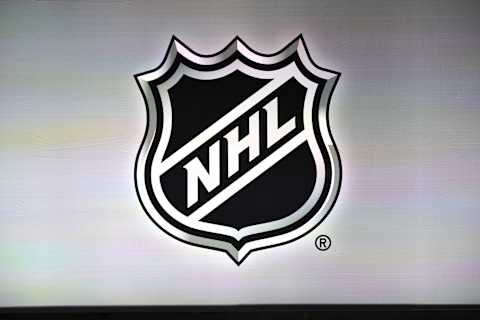
Congratulations to all of the members of the 2018 Hockey Hall of Fame class. Now it’s time to start looking at the class of 2019 and its candidates, along with a hypothetical ballot.
There’s no greater debate among sports fans than who should be in the Hall of Fame. This is no different for hockey fans. Especially since the Hockey Hall of Fame’s standards for enshrinement are hard to gauge.
The 2018 Hall of Fame class was a great one. It featured some of the best players to ever lace up a pair of skates. Unfortunately, the 2019 class isn’t going to have a slam dunk case like Martin Brodeur. At least not on the NHL side.
More from Puck Prose
- Detroit Red Wings 2023 Rookie Camp Has Plenty of Ups and Downs
- This Columbus Blue Jackets rookie doesn’t want to be forgotten
- 2 trades the Boston Bruins must make to secure the Stanley Cup
- 3 reasons the Avalanche won’t win the Stanley Cup in 2024
- This is a big year for Alex Turcotte and the Los Angeles Kings
Here at Puck Prose, we’re not afraid to give out our opinions. That’s why our expert Dave Stevenson is going to give his hypothetical ballot for 2019. This ballot will address several concerns regarding the Hockey Hall of Fame while rewarding the deserving candidates.
Much like Cooperstown, there’s a bit of a logjam as far as candidates are concerned. And unlike baseball, there are no real guidelines regarding who to vote for. My ballot is going to be a bit more generous than most people’s would. And I’m fine with that, especially since the 2019 candidates should help diversify the Hall of Fame and help it accomplish its true purpose (rewarding the best players).
My guidelines for selecting candidates were simple. I looked at players who made significant impacts. Players who were the best at what they did. And I voted them. My ballot wound up consisting of five players.
Just Missing The Cut
Let’s get this out of the way. If you want to be mad at me for not including a player, get it out of your system because here are the players who just missed the cut (and why they did).
Doug Wilson
Doug Wilson was a very good defenseman. At times, he was great! But Wilson didn’t have enough “great” seasons to warrant enshrinement. His peak ended a little bit too early for my liking. That said, if the Hall comes calling for Wilson, he wouldn’t even be in the bottom 10 for “worst guys in the Hall of Fame”.
John Vanbiesbrouck
John Vanbiesbrouck is arguably the best American goaltender of all-time. I’m usually one to ignore or overlook off the ice issues, but not when it involves racism. Yes, the Hall needs more goalies. But there are better ways to address this issue than letting in Vanbiesbrouck.
Alexander Mogilny
Alexander Mogilny was a great goal scorer who played during a great goal scoring era. But he didn’t hit the magic number 500 for career goals and he only finished in the top 10 in goals three times.
Theo Fleury
I’m a huge fan of Theoren Fleury. He’s an admirable man for not just battling with substance abuse and mental health, but trying to be a part of the solution in both areas as well. Fleury had some great years, but he’s not a Hall of Famer. Not yet, anyway. Maybe someday, but some other injustices have to be corrected first.
Ken Hitchcock and Joel Quenneville
Builders don’t have to be retired, so it’s time to start considering Ken Hitchcock. He has a Stanley Cup on his resume. Hitchcock has coached for 21 seasons and his teams made the postseason well over half of the time. He’s third all-time in the career wins list. It seems a tad bit too soon to elect him into the Hall of Fame, though. Like a good stew, you must let a coach’s legacy marinate a bit before looking at it.
If it’s too soon for Hitchcock, it’s far too soon to start talking about Joel Quenneville. He’s unquestionably a Hall of Fame coach. Quenneville is the best coach of the salary cap era and has three Stanley Cups on his resume. The question isn’t “if” he’ll get in. It’s “when” he’ll get in. Which is never easy to predict for coaches.
Vincent Lecavalier
Man, that 2003-04 Tampa Bay Lightning team was something else. There have been two straight Hall of Fame classes featuring a member of that team. While it’s an impressive streak, if I can help it, it’s over. Vincent Lecavalier‘s resume gets off to a great start with his 2006-07 Rocket Richard season. But other than that year, only finished in the top 10 in goals and/or points once (2007-08).
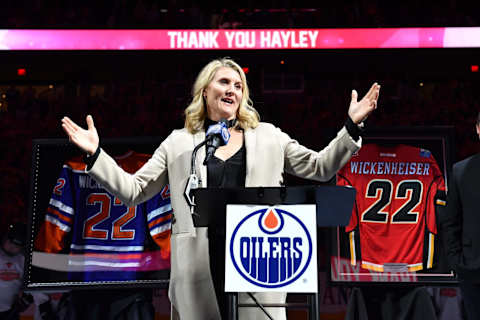
The Headliner
It’s tough to choose who’s going to headline the 2019 class because the stars are very limited. In fact, there’s only one and it’s not even an NHL player. Or a man, for that matter.
Hayley Wickenheiser
Hayley Wickenheiser has fought to prove that women belong on the ice just as much as men do. So perhaps it’s fitting she’s, by a wide margin, the biggest slam dunk in the 2019 class.
Six women hockey players are enshrined in the Hockey Hall of Fame. Hayley Wickenheiser will be the seventh, and you could argue she’s the Wayne Gretzky of women’s hockey. She is most famous for being a part of five Olympic medal-winning teams for Team Canada. Four of those five medals were gold.
Not only did Wickenheiser has a historical career on the ice, but she’s also off to a great start off of it. Recently, she was named the Assistant Director of Player Development for the Toronto Maple Leafs. This shows how much the hockey world respects Wickenheiser, who also holds the distinction of being the first women to score in a men’s professional league, doing so in 2003.
Related Story. Which Number Should Each Team Retire Next?. light
Frankly, I would have had zero objections if she went the same route as Gretzky and had her enshrinement in 2018. Wickenheiser would have been deserving because of how influential she has been in women’s hockey. It’s a year overdue, but she’s a no doubt “yes” for me.
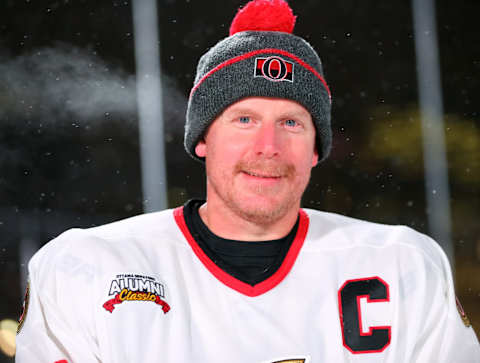
The Headliner (Part Two)
As stated earlier, there’s only one home run pick in the 2019 Hockey Hall of Fame class. Nobody else is in Wickenheiser “no doubt yes” category. However, the second member of my hypothetical 2019 class is as close as it gets. This is his second year on the ballot. Frankly, he should have gotten in this year.
Daniel Alfredsson
There’s no reason why Daniel Alfredsson shouldn’t be in the Hockey Hall of Fame. The strongest argument against him is his lack of individual awards other than the Calder Trophy and the King Clancy Memorial Trophy. You can toss that out the window because he still has more individual awards than a number of Hockey Hall of Famers, including Mike Gartner, Scott Stevens, and Mike Modano.
Alfredsson ranks in the top 50 in era-adjusted goals, era-adjusted assists, and era-adjusted points. Even if you want to use normal goals, assists, and points, he ranks in the top 60 in each of those.
Since the lockout of 1994-95, 73 players have played in at least 1,000 career games. Alfredsson ranks fifth among them in points per game. The four players above him (Joe Thornton, Teemu Selanne, Jaromir Jagr, and Alex Ovechkin) are either enshrined in Toronto (Teemu), will be enshrined in the near future (Jagr), or are in the “could retire tomorrow and they’d be slam dunks” category (Ovechkin and Jagr).
Related Story. Ranking Each Team's All-Time Starting Lineup. light
There’s also his international success, as he has been a staple of Sweden’s international team. Off the ice, there have been few better ambassadors to the game of hockey than Alfredsson. All of this adds up to him being a deserving member of the 2019 class. If he’s not, voters will have a lot of explaining to do.
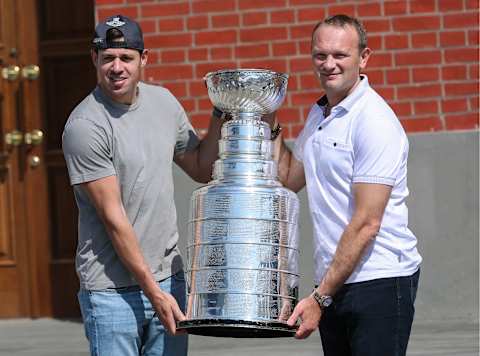
Two Russian Defenders
Here’s a full list of all the Russian defenseman who you can find in the Hall of Fame:
That’s it. The Hall needs to address this issue if it wants to represent hockey’s greatest players more effectively. Luckily, there are two very qualified individuals who warrant enshrinement in Toronto – Sergei Zubov and Sergei Gonchar. After trying to decide which one was more deserving, I decided…
Sergei Zubov
There are very few candidates better than Sergei Zubov. You could argue Gonchar, as he’s the career leader for points among NHL players born in Russia or the USSR with 811. Zubov ranks second with 771. However, he is ahead of Gonchar in points per game (0.722 compared to 0.623).
Admittedly, Zubov doesn’t have the awards resume of Gonchar. He only finished in the top five of the Norris Trophy twice and was only a finalist once. Zubov does, however, have his comrade beaten in Stanley Cups (two to one) and Olympic gold medals (one to zero).
Gonchar
Gonchar is the more recognizable name of the two. He had a longer NHL career, was consistently in the Norris Trophy discussion (four top-five finishes), and his slapshot was a lethal weapon. His 811 points, which rank 17th among his blueline peers, is impressive enough.
However, era-adjusted points put his career in perspective. Gonchar is ninth all-time in era-adjusted points among defensemen. Zubov, by the way, is 13th. Everyone above Zubov (sans Gonchar) is in the Hall of Fame.
Related Story. Greatest Player To Wear Each Jersey Number. light
Politics often plays a role in who gets enshrined in hockey’s cathedral. Undeniably, politics is why Zubov has been eligible for six years and failed to get in. His induction is long overdue. But just because Zubov had to wait doesn’t mean Gonchar should have to wait too. The Hall of Fame has never had two Russians in one class. But there’s a first time for everything.
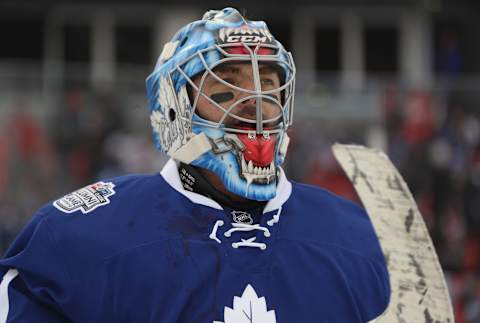
Lowering The Bar For Goalies
I have only seen five Hall of Fame goalies play in my lifetime – Patrick Roy, Grant Fuhr, Dominik Hasek, Ed Belfour, and Martin Brodeur. The standards for goalies getting into the Hall of Fame is a bit too high. It’s time to lower them. But at the same time, let’s not lower it to the floor. Curtis Joseph is the perfect compromise.
I hate goaltending wins as a stat. Ironically, Joseph’s 454 wins (fifth all-time as of Nov. 12) highlight his Hall of Fame case. Everyone else in the top 10 is either enshrined in Toronto, will be once they retire, or is an enigma (hi Marc-Andre Fleury, I can’t wait to argue about you).
Though he never won a Vezina Trophy, he thrice finished in the top three and finished in the top five on five occasions. Joseph, for what it’s worth, was absolutely robbed of the Vezina in 1992-93, likely due to (you guessed it) his lack of wins.
The case against Joseph is strong. If you ignore his wins, not much else about him stands out. Joseph was an above-average goalie on a pretty consistent basis, but outside of a few dominant years, he was never an elite one.
Next. Every Team's Mount Rushmore. dark
And you know what? That’s fine. You don’t have to be elite to be in the Hall of Fame. During his prime, Joseph was a pillar of consistency for goalies. Going off his GSAA (goals saved above average), he had 12 above-average seasons.